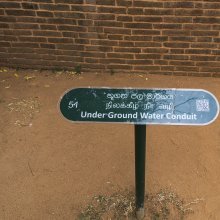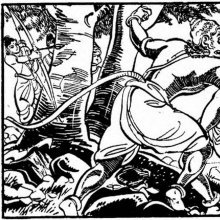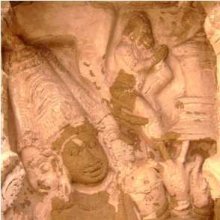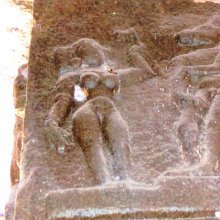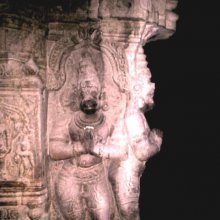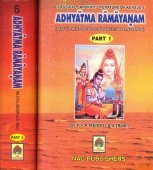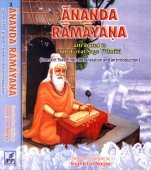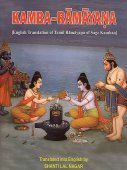Vali, Vālī, Vāli: 27 definitions
Introduction:
Vali means something in Hinduism, Sanskrit, Buddhism, Pali, the history of ancient India, Marathi, Jainism, Prakrit, Hindi, biology, Tamil. If you want to know the exact meaning, history, etymology or English translation of this term then check out the descriptions on this page. Add your comment or reference to a book if you want to contribute to this summary article.
Images (photo gallery)
(+9 more images available)
In Hinduism
Vaishnavism (Vaishava dharma)
Source: ISKCON Press: GlossaryVāli (वालि).—Name of a monkey who was the son of Indra, the King of heaven, and elder brother of Sugrīva, the monkey king in the epic Rāmāyaṇa.

Vaishnava (वैष्णव, vaiṣṇava) or vaishnavism (vaiṣṇavism) represents a tradition of Hinduism worshipping Vishnu as the supreme Lord. Similar to the Shaktism and Shaivism traditions, Vaishnavism also developed as an individual movement, famous for its exposition of the dashavatara (‘ten avatars of Vishnu’).
Purana and Itihasa (epic history)
Source: Cologne Digital Sanskrit Dictionaries: The Purana Index1a) Vāli (वालि).—A son of Virajā (the daughter of Ṛkṣa) and Mahendra. Crowned king of Kiṣkinda and ruled with Sugrīva; wife Tārā and son Angada: crossed the seas, vanquished Rāvaṇa at Puṣkara, and agreed to be his ally on his request; performed Vedic yajñas, learned in the Vedic lore; applauded by Nārada;1 killed by Rāma.2
1b) An Asura in the sabhā of Hiraṇyakaśipu.*
- * Matsya-purāṇa 161. 81.
1c) An avatār of the Lord in the 13th dvāpara in the Vālakhilyāśrama of the Gandhamādana with tapasvin sons.*
- * Vāyu-purāṇa 23. 159.

The Purana (पुराण, purāṇas) refers to Sanskrit literature preserving ancient India’s vast cultural history, including historical legends, religious ceremonies, various arts and sciences. The eighteen mahapuranas total over 400,000 shlokas (metrical couplets) and date to at least several centuries BCE.
Natyashastra (theatrics and dramaturgy)
Source: Wisdom Library: SaṅgītaśiromaṇiVali (वलि, “wrinkle”) refers to one of the fifteen aspects of gamaka (embellishments, ornamentation) that are used in Indian classical music (gāndharva), according to the Saṅgītaśiromaṇi 14.83-94. These gamakas refer to essential elements of the sthāyas (technical phrases) of rāgas (melodic modes). Accordingly, “a vribrato (kampana) rendered in various speeds is considered to be a vali”.
Source: archive.org: Northern Indian Music Volume IVali (वलि, “ripple”) refers to one of the gamakas (graces):—The ripple (vali), now called mīḍa.—“Any kind of fast sliding is called a ripple (vali)”. (Saṅgītaratnākara 2.3.92)

Natyashastra (नाट्यशास्त्र, nāṭyaśāstra) refers to both the ancient Indian tradition (shastra) of performing arts, (natya—theatrics, drama, dance, music), as well as the name of a Sanskrit work dealing with these subjects. It also teaches the rules for composing Dramatic plays (nataka), construction and performance of Theater, and Poetic works (kavya).
Ayurveda (science of life)
Kalpa (Formulas, Drug prescriptions and other Medicinal preparations)
Source: Shodhganga: Edition translation and critical study of yogasarasamgrahaValī (वली) refers to “wrinkles” and is one of the various diseases mentioned in the 15th-century Yogasārasaṅgraha (Yogasara-saṅgraha) by Vāsudeva: an unpublished Keralite work representing an Ayurvedic compendium of medicinal recipes. The Yogasārasaṃgraha [mentioning valī] deals with entire recipes in the route of administration, and thus deals with the knowledge of pharmacy (bhaiṣajya-kalpanā) which is a branch of pharmacology (dravyaguṇa).
Unclassified Ayurveda definitions
Source: gurumukhi.ru: Ayurveda glossary of termsVali (वलि):—Wrinkles

Āyurveda (आयुर्वेद, ayurveda) is a branch of Indian science dealing with medicine, herbalism, taxology, anatomy, surgery, alchemy and related topics. Traditional practice of Āyurveda in ancient India dates back to at least the first millenium BC. Literature is commonly written in Sanskrit using various poetic metres.
General definition (in Hinduism)
Source: Apam Napat: Indian MythologyVali was the king of monkeys. He is said to be the son of the sage Kashyapa. He had obtained a boon that he would get half of his opponent's strength in combat. This made him invincible in fair combat. He fell out with his younger brother Sugreeva, who sought the help of Rama in killing his brother.
According to the promise made to Sugreeva, Rama killed Vali with an arrow, fired from a hidden spot when Vali was fighting with Sugreeva. This way Rama avoided losing half his strength, as he was hidden from Vali.
Source: WikiPedia: HinduismVālī (वाली): One of five great monkeys in Ramayana, a son of Indra, Monkey-king of Kishkindha and the cruel elder brother of Sugriva. He was killed by Rama.
India history and geography
Source: Cologne Digital Sanskrit Dictionaries: Indian Epigraphical GlossaryVāḻi.—(SII 2), ear-ring. Note: vāḻi is defined in the “Indian epigraphical glossary” as it can be found on ancient inscriptions commonly written in Sanskrit, Prakrit or Dravidian languages.
Source: Institut Français de Pondichéry: The Shaivite legends of KanchipuramVāli (வாலி) (in Tamil) refers to Vālin in Sanskrit, and represents one of the proper nouns mentioned in the Kanchipuranam, which narrates the Shaivite Legends of Kanchipuram—an ancient and sacred district in Tamil Nadu (India). The Kanchipuranam (mentioning Vāli) reminds us that Kanchipuram represents an important seat of Hinduism where Vaishnavism and Shaivism have co-existed since ancient times.

The history of India traces the identification of countries, villages, towns and other regions of India, as well as mythology, zoology, royal dynasties, rulers, tribes, local festivities and traditions and regional languages. Ancient India enjoyed religious freedom and encourages the path of Dharma, a concept common to Buddhism, Hinduism, and Jainism.
Biology (plants and animals)
Source: Google Books: CRC World Dictionary (Regional names)Vali in India is the name of a plant defined with Setaria verticillata in various botanical sources. This page contains potential references in Ayurveda, modern medicine, and other folk traditions or local practices It has the synonym Panicum respiciens (Hochst. ex A. Rich.) Hochst. ex Steud. (among others).
Example references for further research on medicinal uses or toxicity (see latin names for full list):
· Taschenbuch fur den Schweizerschen Botaniker (1869)
· Flore de Lorraine (1844)
· Essai d’une Nouvelle Agrostographie (1812)
· Systema Vegetabilium, editio decima sexta (1825)
· Enumeratio Plantarum Horti Regii Berolinensis Altera (1821)
· Florae Africae Australioris Illustrationes Monographicae (1841)
If you are looking for specific details regarding Vali, for example chemical composition, side effects, diet and recipes, pregnancy safety, extract dosage, health benefits, have a look at these references.

This sections includes definitions from the five kingdoms of living things: Animals, Plants, Fungi, Protists and Monera. It will include both the official binomial nomenclature (scientific names usually in Latin) as well as regional spellings and variants.
Languages of India and abroad
Pali-English dictionary
Source: BuddhaSasana: Concise Pali-English Dictionaryvali : (f.) a fold; a wrinkle.
Source: Sutta: The Pali Text Society's Pali-English DictionaryVali, & Valī (f.) (cp. Epic Sk. vali; fr val. Spelling occasionally with ḷ) a line, fold, wrinkle, a streak, row; Vin. II, 112 (read valiyo for valiṃ?); Th. 2, 256; J. IV, 109; Shhp 104.—muttā-vali a string of pearls VvA. 169. For vaṭṭanā-valī see vaṭṭanā. See also āvali. (Page 603)

Pali is the language of the Tipiṭaka, which is the sacred canon of Theravāda Buddhism and contains much of the Buddha’s speech. Closeley related to Sanskrit, both languages are used interchangeably between religions.
Marathi-English dictionary
Source: DDSA: The Molesworth Marathi and English Dictionaryvalī (वली).—m ( A) A saint, sage, devotee, a sacred personage in general.
--- OR ---
vaḷī (वळी).—f (vaḷaṇēṃ) A stuffed roll or pad placed across and underneath the packsaddle. 2 A roll, a thing rolled up. 3 Uniting threads together. A term of the loom. See sāndhaṇī.
--- OR ---
vaḷī (वळी).—f (āvali S) A line, row, rank. 2 A line as drawn by the pen, or a line of writing. 3 fig. Course, fashion, line of deportment or procedure. 4 A corrugation or wrinkle (esp. abdominal).
--- OR ---
vālī (वाली) [or वाल्ही, vālhī].—m ( A) A protector, patron, befriender; an espouser of the cause of. 2 Master, lord, owner, proprietor. jivācā or prāṇācā vālī A husband or a lover.
--- OR ---
vāḷī (वाळी).—f (vāḷā) A ring of gold or silver wire, for the nose or ear. 2 A plant, also called vēla- bōṇḍī, Basella rubra et alba.
Source: DDSA: The Aryabhusan school dictionary, Marathi-Englishvaḷī (वळी).—f A line, row. A roll. Fig. A course; fashion.
--- OR ---
vālī (वाली).—m A protector; master.
--- OR ---
vāḷī (वाळी).—f A ring of gold wire, for the nose or ear.
Marathi is an Indo-European language having over 70 million native speakers people in (predominantly) Maharashtra India. Marathi, like many other Indo-Aryan languages, evolved from early forms of Prakrit, which itself is a subset of Sanskrit, one of the most ancient languages of the world.
Sanskrit dictionary
Source: DDSA: The practical Sanskrit-English dictionaryVali (वलि) or Valī (वली).—f. (Also written baliḥ-lī)
1) A fold or wrinkle (on the skin); वलिभिर्मुखमाक्रान्तम् (valibhirmukhamākrāntam).
2) A fold of skin on the upper part of the belly (especially of females regarded as a mark of beauty); मध्येन सा वेदि- विलग्नमध्या वलित्रयं चारु वभार बाला (madhyena sā vedi- vilagnamadhyā valitrayaṃ cāru vabhāra bālā) Kumārasambhava 1.39.
3) The ridge of a thatched roof.
4) A line made on the body with fragrant unguents.
5) A handle of the Chāmara; रत्नच्छायाखचितवलिभिश्चामरैः क्लान्तहस्ताः (ratnacchāyākhacitavalibhiścāmaraiḥ klāntahastāḥ) Meghadūta 37.
6) Sulphur.
Derivable forms: valiḥ (वलिः).
--- OR ---
Vāli (वालि).—Name of a celebrated monkeychief, who was slain by Rāma at the desire of Sugrīva, his younger brother. [He is represented as a very powerful monkey, and is said to have placed under his arm-pit even Rāvaṇa when he went to fight with him. During his absence from Kiṣkindhā to slay the brother of Dundubhi, Sugriva usurped the throne considering him to be dead, but when Vāli returned, he had to run away to Ṛiṣyamūka. Tārā, wife of Sugrīva, was seized by Vāli, but she was restored to her husband when Rāma slew him.]
Derivable forms: vāliḥ (वालिः).
Source: Cologne Digital Sanskrit Dictionaries: Edgerton Buddhist Hybrid Sanskrit DictionaryVali (वलि).—f. or m. (perhaps compare Sanskrit Lex. balikā? see [Boehtlingk]), a kind of flower: Mahāvyutpatti 6209 baliḥ; also Tibetan ba-li in the passage cited from ms. H by Lefm. on Lalitavistara 11.3, instead of varṇa as cited.
--- OR ---
Vāli (वालि).—(supported by Tibetan; most mss. Vāri), name of a gandharva: Suvarṇabhāsottamasūtra 162.2.
Source: Cologne Digital Sanskrit Dictionaries: Shabda-Sagara Sanskrit-English DictionaryVali (वलि).—f. (-liḥ or lī) 1. A line or streak made with fragrant unguents on the person. 2. Natural line or folds of skin, a wrinkle m.
(-liḥ) Offerings to the spirits of air. E. val to surround, aff. in: see bali .
Source: Cologne Digital Sanskrit Dictionaries: Cappeller Sanskrit-English DictionaryVali (वलि).—[feminine] fold of skin, wrinkle.
--- OR ---
Valī (वली).—[feminine] fold of skin, wrinkle.
Source: Cologne Digital Sanskrit Dictionaries: Monier-Williams Sanskrit-English Dictionary1) Vali (वलि):—[from val] mf. (cf. bali and valī) (once m.) a fold of the skin, wrinkle, [Mahābhārata; Kāvya literature] etc. (cf. tri-v)
2) [v.s. ...] a line or stroke made with fragrant unguents on the person, [cf. Lexicographers, esp. such as amarasiṃha, halāyudha, hemacandra, etc.]
3) [v.s. ...] the edge of a roof, [Viṣṇu-purāṇa]
4) [v.s. ...] sulphur, [cf. Lexicographers, esp. such as amarasiṃha, halāyudha, hemacandra, etc.]
5) [v.s. ...] a [particular] musical instrument, [cf. Lexicographers, esp. such as amarasiṃha, halāyudha, hemacandra, etc.]
6) Valī (वली):—[from val] f. = vali, a fold, wrinkle, [Mahābhārata; Kāvya literature] etc.
7) [v.s. ...] a wave, [cf. Lexicographers, esp. such as amarasiṃha, halāyudha, hemacandra, etc.]
8) Vālī (वाली):—[from vāla] f. a post, pillar, [Anupada-sūtra] (= medhi, [cf. Lexicographers, esp. such as amarasiṃha, halāyudha, hemacandra, etc.])
9) [v.s. ...] a kind of ornament, [cf. Lexicographers, esp. such as amarasiṃha, halāyudha, hemacandra, etc.]
10) [v.s. ...] a pit, cavern, [cf. Lexicographers, esp. such as amarasiṃha, halāyudha, hemacandra, etc.]
11) Vāli (वालि):—[from vāla] 1. vāli m. (also written bāli) = vālin Name of a monkey, [Rāmāyaṇa]
12) [v.s. ...] of a Muni, [Catalogue(s)]
13) [v.s. ...] 2. vāli in [compound] for vālin.
Source: Cologne Digital Sanskrit Dictionaries: Yates Sanskrit-English DictionaryVali (वलि):—(liḥ) 2. f. A streak made with unguents; fold or wrinkle; an offering to the spirits of air.
Source: DDSA: Paia-sadda-mahannavo; a comprehensive Prakrit Hindi dictionary (S)Vali (वलि) in the Sanskrit language is related to the Prakrit words: Vali, Valī, Vāli.
[Sanskrit to German]
Sanskrit, also spelled संस्कृतम् (saṃskṛtam), is an ancient language of India commonly seen as the grandmother of the Indo-European language family (even English!). Closely allied with Prakrit and Pali, Sanskrit is more exhaustive in both grammar and terms and has the most extensive collection of literature in the world, greatly surpassing its sister-languages Greek and Latin.
Hindi dictionary
Source: DDSA: A practical Hindi-English dictionaryValī (वली):—(nm) guardian, master; successor, heir; ~[ahada] heir-apparent, heir-designate. -[vārisa] guardian or heir, near relative, kith.
...
Prakrit-English dictionary
Source: DDSA: Paia-sadda-mahannavo; a comprehensive Prakrit Hindi dictionary1) Vali (वलि) in the Prakrit language is related to the Sanskrit word: Vali.
2) Valī (वली) also relates to the Sanskrit word: Valī.
3) Vāli (वालि) also relates to the Sanskrit word: Vāli.
4) Vāli (वालि) also relates to the Sanskrit word: Vālin.
5) Vāli (वालि) also relates to the Sanskrit word: Vālin.
6) Vālī (वाली) also relates to the Sanskrit word: Pālī.
Prakrit is an ancient language closely associated with both Pali and Sanskrit. Jain literature is often composed in this language or sub-dialects, such as the Agamas and their commentaries which are written in Ardhamagadhi and Maharashtri Prakrit. The earliest extant texts can be dated to as early as the 4th century BCE although core portions might be older.
Kannada-English dictionary
Source: Alar: Kannada-English corpusVali (ವಲಿ):—
1) [noun] a fold of the skin.
2) [noun] any of the three folds of the skin above the navel of a woman.
3) [noun] a form of a moving ridge or swell on the surface of a water body, caused by the internal or external disturbance; a wave.
4) [noun] the surging or progressing movement of a wave on the surface of water in the sea.
5) [noun] a thin mark joining two points on the same plane; a line.
6) [noun] a plucking of a string of a musical instrument, with a jerking movement.
7) [noun] a regulated, oscillation of a musical note, to give a more aesthetic effect.
--- OR ---
Vali (ವಲಿ):—[noun] a sage; an ascetic.
--- OR ---
Vali (ವಲಿ):—[noun] a time or opportunity for action which comes in due rotation or order to each of a number of persons, animals, etc.; a time; a turn.
--- OR ---
Vaḷi (ವಳಿ):—[verb] to turn back or towards a side.
--- OR ---
Vaḷi (ವಳಿ):—
1) [noun] a fold of the skin.
2) [noun] any of the three folds of the skin above the navel of a woman.
3) [noun] a form of a moving ridge or swell on the surface of a water body, caused by the internal or external disturbance; a wave.
4) [noun] the surging or progressing movement of a wave on the surface of water in the sea.
5) [noun] a thin mark joining two points on the same plane; a line.
6) [noun] a plucking of a string of a musical instrument, with a jerking movement.
7) [noun] a regulated, oscillation of a musical note, to give a more aesthetic effect.
--- OR ---
Vaḻi (ವೞಿ):—[noun] a way, path, road.
--- OR ---
Vāli (ವಾಲಿ):—
1) [noun] a character in Rāmāyaṇa, a strong and powerful king of Kiṣkindhe.
2) [noun] ವಾಲಿ-ಸುಗ್ರೀವರು [vali-sugrivaru] vāli sugrīvaru (fig.) a pair of mutually hating and fighting brothers.
--- OR ---
Vāḷi (ವಾಳಿ):—[noun] = ವಾಹಳಿ [vahali].
--- OR ---
Vāḷi (ವಾಳಿ):—
1) [adjective] not yielding to argument, persuasion or entreaty; obstinate; adamant.
2) [adjective] low; mean; despicable; contemptible.
--- OR ---
Vāḷi (ವಾಳಿ):—[noun] the quality of being mean, despicable; contemptibileness.
Kannada is a Dravidian language (as opposed to the Indo-European language family) mainly spoken in the southwestern region of India.
Tamil dictionary
Source: DDSA: University of Madras: Tamil LexiconVali (வலி) noun < வன்-மை. [van-mai.] cf. bala.
1. Strength, power; வன்மை. வலியி னிலைமையான் [vanmai. valiyi nilaimaiyan] (திருக்குறள் [thirukkural], 273).
2. See வலாற்காரம். வலிசெயா தாணை யை நினைந்து [valarkaram. valiseya thanai yai ninainthu] (திருவாலவாயுடையார் திருவிளையாடற் [thiruvalavayudaiyar thiruvilaiyadar] 57, 5).
3. Arrogance; அகங்காரம். கேள்வி யனைத்தினும் வலியினும் மனத் தினு முணர்வினும் [agangaram. kelvi yanaithinum valiyinum manath thinu munarvinum] (பரிபாடல் [paripadal] 3, 49).
4. cf. balin. (Grammar) Hard consonant; வல்லெழுத்து. ஈற்று மெய் வலிவரி னியல்பாம் [vallezhuthu. irru mey valivari niyalpam] (நன். [nan.] 159).
5. (Rhetoric) Vigour of style, achieved by introducing compounds in quick succession, a merit of poetic composition; தொகைநிலைத்தொடர் மிக்கு வருஞ் செய்யுட்குணம். [thogainilaithodar mikku varugn seyyudkunam.] (தண்டியலங்காரம் [thandiyalangaram] 24.)
6. Prop, support; பற்றுக்கோடு. தண்டு வலியாக நனி தாழ்ந்து [parrukkodu. thandu valiyaga nani thazhnthu] (சீவகசிந்தாமணி [sivagasindamani] 2012).
7. Cramp-iron; pincers; பற்றிரும்பு. (பிங்கலகண்டு) [parrirumbu. (pingalagandu)]
8. Trouble, difficulty; கஷ்டம். அதைச் செய் வதில் உனக்கென்ன வலி. [kashdam. athais sey vathil unakkenna vali.]
9. Pain, ache; நோவு. யான்பட்ட வலிகாண வாராயோ [novu. yanpatta valigana varayo] (கம்பராமாயணம் சூர்ப்ப. [kambaramayanam surppa.] 102).
--- OR ---
Vali (வலி) [valital] 4 verb < வலி¹. [vali¹.] intransitive
1. To be hard; திண்ணியதாதல். வலிந்த தோள்வலி வாளரக்கன் [thinniyathathal. valintha tholvali valarakkan] (தேவாரம் [thevaram] 308, 10).
2. To be stressed, as words; உச்சரிப்பில் அழுத்தமாதல். [ucharippil azhuthamathal.]
3. (Grammar) To become hard in sound, as a soft consonant; மெல்லெழுத்து வல்லெழுத்தாதல். [mellezhuthu vallezhuthathal.] (புறநானூறு [purananuru] 6, உரை. [urai.])
4. To be strained, as an interpretation; நேர்வழி யிற் பொருள் கொள்ளாது இடர்ப்படுதல். வலிந்த கருத்து. [nervazhi yir porul kollathu idarppaduthal. valintha karuthu.] (W.)
5. To act of one’s own free will; தானாக முன்வந்து செய்தல். வந்து வலியவாட் கொண் டது [thanaga munvanthu seythal. vanthu valiyavad kon dathu] (பெரியபுராணம் தடுத்தாட். [periyapuranam thaduthad.] 68).
6. To exert oneself; முயலுதல். [muyaluthal.] (W.)
7. To survive, revive; உய்தல். (பிங்கலகண்டு) [uythal. (pingalagandu)]
8. To abide, remain, stay; தங்குதல். (யாழ்ப்பாணத்து மானிப்பாயகராதி) [thanguthal. (yazhppanathu manippayagarathi)]
9. To venture; துணிவு கொள்ளுதல். [thunivu kolluthal.] (W.) — transitive
1. To force, compel; பலவந்தப்படுத்துதல். வலிந்து பற்றினான். [palavanthappaduthuthal. valinthu parrinan.]
2. To transgress, transcend; மீறுதல். அருளினை வலிய மாட்டாமை [miruthal. arulinai valiya mattamai] (பெரியபுராணம் திருநீலக். [periyapuranam thirunilag.] 34).
--- OR ---
Vali (வலி) [valittal] 11 verb < idem. transitive
1. To force, compel; பலவந்தப்படுத்துதல். வலித்தாண்டு கொண்ட [palavanthappaduthuthal. valithandu konda] (திருவாசகம் [thiruvasagam] 11, 7).
2. To seize; பற்றிக் கொள்ளுதல். கொண்டு கைவலித்தல் சூழ்ந்திசின் யானே [parrig kolluthal. kondu kaivalithal suzhnthisin yane] (அகநா. [agana.] 76).
3. To strain, as an interpretation; இடர்ப்பட்டுப்பொருள் கொள்ளுதல். [idarppattupporul kolluthal.] (W.)
4. To stress, as words; அழுத்தி யுச்சரித்தல். [azhuthi yucharithal.] (W.)
5. (Grammar) To become hard in sound, as a soft consonant; மெல்லெழுத்தை வல்லெழுத் தாக்குதல். வலிக்கும் வழி வலித்தலும் [mellezhuthai vallezhuth thakkuthal. valikkum vazhi valithalum] (தொல். சொல். [thol. sol.] 403).
6. To decide; துணிதல். வல்வினை வயக்கு தல் வலித்திமன் [thunithal. valvinai vayakku thal valithiman] (கலித்தொகை [kalithogai] 17).
7. To dry, scorch, parch; வற்றச்செய்தல். [varracheythal.] (W.) — intransitive
1. To become hard; திண்ணியதாதல். கல்லென வலித்து நிற்பின் [thinniyathathal. kallena valithu nirpin] (கம்பராமாயணம் வருண. [kambaramayanam varuna.] 84).
2. To become dry; வற்றுதல். நீர்நுங்கின் கண்வலிப்ப [varruthal. nirnungin kanvalippa] (புறநானூறு [purananuru] 389).
3. To ache; to be painful; நோவுண்டாதல். வலிக் கின்றது சூலை தவிர்த்தருளீர் [novundathal. valig kinrathu sulai thavirtharulir] (தேவாரம் [thevaram] 946, 7).
4. To make efforts; முயலுதல். [muyaluthal.] (W.)
5. To become stout; கொழுத்தல். (திவா.) [kozhuthal. (thiva.)]
--- OR ---
Vali (வலி) [valittal] 11 transitive verb cf. வல³-. [vala³-.]
1. To say, tell, narrate; சொல்லுதல். (சூடாமணிநிகண்டு) [solluthal. (sudamaninigandu)]
2. To think, consider; ஆலோசித்தல். வலியா தெனக்கு வம்மி னீரென [alosithal. valiya thenakku vammi nirena] (பெருங்கதை வத்தவ. [perungathai vathava.] 3, 99). (பிங்கலகண்டு [pingalagandu])
3. To execute with undivided attention, as a work; கருத்தோடுசெய்தல். திங்கள் வலித்த காலன் னோனே [karuthoduseythal. thingal valitha kalan none] (புறநானூறு [purananuru] 87).
4. To agree to, consent to; உடன்படுதல். (பிங்கலகண்டு) செல்லல் வலித் தேனச் செம்மன்முன் [udanpaduthal. (pingalagandu) sellal valith thenas semmanmun] (புறப்பொருள்வெண்பாமாலை [purapporulvenpamalai] 11, பெண்பாற். [penpar.] 12).
--- OR ---
Vali (வலி) noun < வலி⁴-. [vali⁴-.]
1. Sound; ஒலி. (பிங்கலகண்டு) [oli. (pingalagandu)]
2. Vow; சபதம். போக்கரும் வலிபுகன்று போய்வரு மாயை [sapatham. pokkarum valipuganru poyvaru mayai] (பிரபுலிங்கலீலை வசவண். [pirapulingalilai vasavan.] 31).
3. Deceit, fraud, guile; வஞ்சம். (பிங்கலகண்டு) [vancham. (pingalagandu)]
--- OR ---
Vali (வலி) [valittal] 11 verb cf. val. transitive
1. To draw, pull; to attract, இழுத்தல். புலித்தோல் வலித்து வீக்கி [izhuthal. pulithol valithu vikki] (தேவாரம் [thevaram] 910, 3). சார்ங்கம் வளைய வலிக்கும் [sarngam valaiya valikkum] (நாலாயிர திவ்யப்பிரபந்தம் நாய்ச். [nalayira thivyappirapandam nays.] 5, 8).
2. To bend, curve; வளைத்தல். (சூடாமணிநிகண்டு) [valaithal. (sudamaninigandu)]
3. To mimic; அழகுகாட்டுதல். [azhagukattuthal.] Tinnevelly usage
4. To row, tug; தண்டாற் படவு தள்ளுதல். [thandar padavu thalluthal.]
5. To hoist, as the sails of a vessel; கப்பற்பாய் தூக்குதல். [kapparpay thukkuthal.]
6. To smoke, as tobacco; புகை குடித்தல். [pugai kudithal.] Local usage — intransitive
1. To have contortions or convulsions; இசிவு காணுதல். [isivu kanuthal.]
2. To pine, droop, languish; ஏங்குதல். [enguthal.] (W.)
--- OR ---
Vali (வலி) noun < வலி⁶-. [vali⁶-.]
1. Pulling, dragging; attracting; இழுக்கை. [izhukkai.]
2. Cramp, spasm, convulsion, fit, of five kinds, viz., amara-kaṇṭam, kumara-kaṇṭam, pirama-kaṇṭam, kākkaivali, muyalvali; அமரகண்டம், குமரகண்டம், பிரம கண்டம், காக்கைவலி முயல்வலி என்று ஐவகைப் பட்ட இசிவுநோய். [amaragandam, kumaragandam, pirama kandam, kakkaivali muyalvali enru aivagaip patta isivunoy.] (தைலவருக்கச்சுருக்கம் தைல. [thailavarukkachurukkam thaila.] 75.)
3. Remuneration to the owners of the boats used in pearl-fishery being one day’s gathering in eight; கப்பற்காரர்க்குக் கொடுக்குஞ் சலாபத்தின் எட்டி லொருபாகம். [kapparkararkkug kodukkugn salapathin etti lorupagam.] (W.)
--- OR ---
Vali (வலி) [valital] 4 transitive verb cf. val. To draw, pull; to attract; இழுத்தல். காந்தம் வலியு மிரும்பு போல் [izhuthal. kantham valiyu mirumbu pol] (பிரபுலிங்கலீலை மாயையினுற். [pirapulingalilai mayaiyinur.] 45).
--- OR ---
Vali (வலி) noun < balin. Strong, powerful man; வன்மைபெற்றவன். காய மனவசி வலிகள் [vanmaiperravan. kaya manavasi valigal] (மேருமந்தரபுராணம் [merumandarapuranam] 1097).
--- OR ---
Vali (வலி) noun < vali. cf. வரி¹. [vari¹.] Mark, trace, fold, crease; இரேகை. (யாழ்ப்பாணத்து மானிப்பாயகராதி) [iregai. (yazhppanathu manippayagarathi)]
--- OR ---
Vali (வலி) noun See வலீமுகம். (யாழ்ப்பாணத்து மானிப்பாயகராதி) [valimugam. (yazhppanathu manippayagarathi)]
--- OR ---
Vali (வலி) noun probably from நறுவிலி. [naruvili.] Sebesten. See நறுவிலி. (வைத்திய மலையகராதி) [naruvili. (vaithiya malaiyagarathi)]
--- OR ---
Vaḻi (வழி) noun [K. baḷi, M. vaḻi.]
1. Way, road, path; மார்க்கம். வாழ்நாள் வழியடைக்குங் கல் [markkam. vazhnal vazhiyadaikkung kal] (திருக்குறள் [thirukkural], 38).
2. Origin, source; காரணம். (யாழ்ப்பாணத்து மானிப்பாயகராதி) [karanam. (yazhppanathu manippayagarathi)]
3. Means; உபாயம். அதற்கு ஒரு வழி சொல்லு. [upayam. atharku oru vazhi sollu.]
4. Remedy; பரிகாரம். அந்தத் தப்புக்கு என்ன வழி செய்தான். [parigaram. anthath thappukku enna vazhi seythan.]
5. Homage; வழிபாடு. வையங்காவலர் வழிமொழிந்தொழுக [vazhipadu. vaiyangavalar vazhimozhinthozhuga] (புறநானூறு [purananuru] 8).
6. Course of conduct; ஒழுக்கம். (பிங்கலகண்டு) [ozhukkam. (pingalagandu)]
7. Manner, method, mode; முறைமை. (பிங்கலகண்டு) [muraimai. (pingalagandu)]
8. Posterity, descendants; பின்சந்ததி. வாழ்க்கை வழியெஞ்ச லெஞ்ஞான்று மில் [pinsanthathi. vazhkkai vazhiyencha lejnanru mil] (திருக்குறள் [thirukkural], 44).
9. Race, family, lineage; மரபு. (பிங்கலகண்டு) [marapu. (pingalagandu)]
10. Son; மகன். (சூடாமணிநிகண்டு) [magan. (sudamaninigandu)]
11. Relation, dependant; சுற்றம். செற்றோரை வழிதபுத்தனன் [surram. serrorai vazhithaputhanan] (புறநானூறு [purananuru] 239).
12. Brother; சகோ தரன். (அரு. நி.) [sago tharan. (aru. ni.)]
13. Series; line; succession; பரம்பரை. வழித்தொண்டர் [parambarai. vazhithondar] (பெரியபுராணம் திருநாவுக். [periyapuranam thirunavug.] 333).
14. History or origin of a literary work, one of 11 ciṟappu-p-pāyiram, q.v.; சிறப்புப் பாயிரம் பதினொன்றனுள் ஒன்றாகிய நூல் வந்த நெறி. [sirappup payiram pathinonranul onragiya nul vantha neri.] (நன். [nan.] 46.)
15. Impression, foot-print; trace; சுவடு. யானைக்கால் வழியன்ன [suvadu. yanaikkal vazhiyanna] (புறநானூறு [purananuru] 368).
16. That which is subsequent; பின்னானது. வழிநாட் கிரங்கு மென்னெஞ்சம் [pinnanathu. vazhinad kirangu mennencham] (புறநானூறு [purananuru] 176).
17. Usage; வழக்கு. [vazhakku.] (W.)
18. Antiquity; பழமொழிைமை. [pazhaimai.] (W.)
19. Place; இடம். தலைநாளன்ன புகலொடு வழிசிறந்து [idam. thalainalanna pugalodu vazhisiranthu] (பத்துப்பாட்டு: மலை [pathuppattu: malai] 565).
20. Mountainous region; மலைப் பக்கம். (சீவகசிந்தாமணி அரும்.) [malaip pakkam. (sivagasindamani arum.)]
21. Roundness; திரட்சி. (பிங்கலகண்டு) [thiradsi. (pingalagandu)]
22. Boon; gift; வரம். எவ்வழி நினக்கு வேண்டும் [varam. evvazhi ninakku vendum] (உபதேசகாண்டம் சிவத்துரோ. [upathesagandam sivathuro.] 115). — adverb Afterwards; பின்பு. வழிபயக்கு மூதியமும் [pinpu. vazhipayakku muthiyamum] (திருக்குறள் [thirukkural], 461). — particle
1. An adverbial particle meaning 'in case, under certain circumstances'; வினை யெச்சவிகுதி. [vinai yechaviguthi.] (தொல். சொல். [thol. sol.] 231.)
2. Sign of the locative; ஏழனுருபு. [ezhanurupu.] (நன். [nan.] 302.)
--- OR ---
Vaḻi (வழி) [vaḻital] 4 intransitive verb
1. cf. வடி-. [vadi-.] To overflow; நிரம்பிவடிதல். [nirambivadithal.] Colloq. வழிந்த . . . கார்விடம் [vazhintha . . . karvidam] (கம்பராமாயணம் சூர்ப்பண. [kambaramayanam surppana.] 72).
2. To flow; வடிதல். [vadithal.]
3. cf. வழல்-. [vazhal-.] To be abraded; தோல் வழலுதல். [thol vazhaluthal.] Tinnevelly usage
--- OR ---
Vaḻi (வழி) [vaḻittal] 11 transitive verb Causative of வழி²-. [vazhi²-.] To shed, let flow; வடித்தல். வழிக்குங் கண்ணீரழு வத்து [vadithal. vazhikkung kannirazhu vathu] (கம்பராமாயணம் கடல்காண. [kambaramayanam kadalkana.] 5).
--- OR ---
Vaḻi (வழி) [vaḻittal] 11 transitive verb [K. baḷi.]
1. To wipe; scrape; to gather together, as a pulpy mass; அரைத்த சந்தன முதலியவற்றைத் திரட்டியெடுத்தல். மூக்கை வழித்து [araitha santhana muthaliyavarraith thirattiyeduthal. mukkai vazhithu] (தனிப்பாடற்றிரட்டு [thanippadarrirattu] ii, 383).
2. To rub in with the hand, as an ointment; to smear, as sandal paste; பூசுதல். மார்பின் விரைவழித்து [pusuthal. marpin viraivazhithu] (சீவகசிந்தாமணி [sivagasindamani] 699).
3. To roll up, as one’s clothes; ஆடையைத் திரைத்தல். ஆடையை வழித் துக்கொண்டு ஆற்றில் இறங்கினான். [adaiyaith thiraithal. adaiyai vazhith thukkondu arril iranginan.]
--- OR ---
Vaḻi (வழி) [vaḻittal] 11 transitive verb < மழி-. [mazhi-.] To shave; சவரம்பண்ணுதல். [savarambannuthal.] Colloq.
--- OR ---
Vaḷi (வளி) noun perhaps from val. [Telugu, Malayalam: vali.]
1. Wind, air; காற்று. வளிவழங்கு மல்லன்மா ஞாலங்கரி [karru. valivazhangu mallanma gnalangari] (திருக்குறள் [thirukkural], 245).
2. Whirlwind; சுழல்காற்று. (பிங்கலகண்டு) [suzhalkarru. (pingalagandu)]
3. Windy humour in the body; உடலிலுள்ள வாதக்கூறு. வளிமுதலா வெண்ணிய மூன்று [udalilulla vathakkuru. valimuthala venniya munru] (திருக்குறள் [thirukkural], 941).
4. cf. balin. Hernia; அண்டவாதநோய். [andavathanoy.] (பைஷஜ. [paishaja.] 190.)
--- OR ---
Vaḷi (வளி) noun < āvali. (Jaina philosophy) A small division of time; சிறிய திருமடல் காலவளவுவகை. கணம்வளி யுயிர்ப்புத் தோவம் [siriya thirumadal kalavalavuvagai. kanamvali yuyirpputh thovam] (மேருமந்தரபுராணம் [merumandarapuranam] 94).
--- OR ---
Vāli (வாலி) noun < வால்¹. [val¹.] See வாலியோன். (சூடாமணிநிகண்டு) [valiyon. (sudamaninigandu)]
--- OR ---
Vāli (வாலி) noun < vālin.
1. Vālī, a monkey chief; ஒரு வானரவேந்தன். (கம்பராமாயணம் வாலிவதை.) [oru vanaraventhan. (kambaramayanam valivathai.)]
2. That which has a tail; வாலுடையது. [valudaiyathu.]
3. King-crow; கரிக்குருவி. ((சங்கத்தகராதி) தமிழ்சொல்லகராதி) [karikkuruvi. ((sangathagarathi) thamizhsollagarathi)]
--- OR ---
Vāli (வாலி) noun < sinīvālī. The first day after the new moon. See சினீவாலி. (அரு. நி.) [sinivali. (aru. ni.)]
--- OR ---
Vāli (வாலி) noun cf. ஆலி¹. [ali¹.] Drizzle; மழைத் தூறல். (அரு. நி.) [mazhaith thural. (aru. ni.)]
--- OR ---
Vāli (வாலி) noun < குதிரைவாலி. [kuthiraivali.] Horse tail millet. See குதிரைவாலி. (வைத்திய மூலிகை) [kuthiraivali. (vaithiya muligai)]
--- OR ---
Vāli (வாலி) noun The author of a portion of Tiru-v-icaippā. See திருவாலியமுதனார். அமுத வாலி சொன்ன தமிழ்மாலை [thiruvaliyamuthanar. amutha vali sonna thamizhmalai] (திருவிசைப்பா திருவாலி. [thiruvisaippa thiruvali.] 3, 11).
--- OR ---
Vāḻi (வாழி) < வாழ்-. [vazh-.] optative Optative meaning 'may you prosper'; 'வாழ்க' என்னும் பொருளில் வரும் வியங்கோட்சொல். ['vazhka' ennum porulil varum viyangodsol.] (நன். [nan.] 168.) தடமலர்த்தாள் வாழி [thadamalarthal vazhi] (திருவாசகம் [thiruvasagam] 24, 6). — interjection An expletive; ஓர் அசைச்சொல். [or asaichol.] (சூடாமணிநிகண்டு [sudamaninigandu] 10, 16.)
--- OR ---
Vāḻi (வாழி) [vāḻittal] 11 intransitive verb < idem. To be over-luxuriant in growth and unproductive; மதர்த்துப்போதல். (யாழ்ப்பாணத்து மானிப்பாயகராதி) [matharthuppothal. (yazhppanathu manippayagarathi)]
--- OR ---
Vāḷi (வாளி) noun < idem. [Telugu: vāli.]
1. Swordsman; வாள்வீரன். வாளிக ணிலைபெற மறலு வார் [valviran. valiga nilaipera maralu var] (பரிபாடல் [paripadal] 9, 54).
2. Arrow; அம்பு. மார்புற வாங்குவார் வாளி [ambu. marpura vanguvar vali] (பரிபாடல் [paripadal] 9, 54).
--- OR ---
Vāḷi (வாளி) noun < pāli. Circular course, as of a horse; வட்டமாயோடுகை. வாளிவெம்திருக்குறள் [vattamayodugai. valivembari] (மகாபாரதம் குரு. [magaparatham kuru.] 108).
--- OR ---
Vāḷi (வாளி) noun < vālī. A kind of ear-stud or ear-ring; ஒருவகைக் காதணி. வாளிமுத்தும் [oruvagaig kathani. valimuthum] (குமரகுருபரசுவாமிகள் முத்து. பிள். [kumaraguruparasuvamigal muthu. pil.] 11). (S. I. I. ii, 16.)
--- OR ---
Vāḷi (வாளி) noun < Urdu bālḍi. Bucket; நீர்ச்சால் வகை. [nirchal vagai.] Mod.
Tamil is an ancient language of India from the Dravidian family spoken by roughly 250 million people mainly in southern India and Sri Lanka.
See also (Relevant definitions)
Starts with (+234): Val-illapuccam, Val-ittukurri, Vali Balantina, Vali-eccamaru, Vali-kattumaram, Vali-nataicelavu, Vali-nataipatam, Valia, Valia, Valia-kuppameni, Valiaga, Valiahada, Valiakarai, Valibha, Valibhrit, Valicam, Valican, Valiccai, Valiccal, Valiccalani.
Ends with (+1103): Abhalaci Savali, Abhalaci-savali, Abhijnanaratnavali, Acaryanamavali, Acatuvali, Accavali, Accukkavali, Adarsavali, Addakavali, Addavali, Adhikaranasaravali, Adhyatmakarikavali, Adivali, Aduvali, Aggavali, Aghivali, Aguvali, Aindravali, Ajataulvali, Akamapervali.
Full-text (+551): Trivali, Karavali, Vamshavali, Katuvali, Valimat, Valippo, Valhi, Valipannu, Avali, Valiyanuppu, Vinai-valiceral, Valimant, Dvaravalibhuj, Valinal, Valimukha, Valimatakku, Valiccuttiram, Valiyalai, Valippirivu, Valikkattu.
Relevant text
Search found 54 books and stories containing Vali, Vaali, Vaazhi, Vālī, Vāli, Valī, Vaḷī, Vāḷī, Vaḻi, Vāḻi, Vaḷi, Vāḷi, Vazhi; (plurals include: Valis, Vaalis, Vaazhis, Vālīs, Vālis, Valīs, Vaḷīs, Vāḷīs, Vaḻis, Vāḻis, Vaḷis, Vāḷis, Vazhis). You can also click to the full overview containing English textual excerpts. Below are direct links for the most relevant articles:
Tiruvaymoli (Thiruvaimozhi): English translation (by S. Satyamurthi Ayyangar)
Pasuram 2.6.9 < [Section 6 - Sixth Tiruvaymoli (Vaikunta Manivannane)]
Pasuram 9.1.2 < [Section 1 - First Tiruvaymoli (Konta pentir)]
Pasuram 1.1.11 < [Section 1 - First Tiruvaymoli (Uyarvu ara Uyar Nalam)]
Hanuman Nataka (critical study) (by Nurima Yeasmin)
Hanuman-Nāṭaka, Act 5 (Summary) < [Chapter 3]
9.15. The characters of Vālī and Sugrīva < [Chapter 4]
Source of the Plot < [Chapter 3]
Mahabharata (English) (by Kisari Mohan Ganguli)
Section XCVIII < [Anusasanika Parva]
Section XCIX < [Anusasanika Parva]
Section C < [Anusasanika Parva]
Ramayana (by Manmatha Nath Dutt)
Chapter XXIX < [Book 1 - Bāla-kāṇḍa]
Chapter I < [Book 1 - Bāla-kāṇḍa]
Chapter XVII < [Book 1 - Bāla-kāṇḍa]
Chaitanya Bhagavata (by Bhumipati Dāsa)
Verse 3.4.330 < [Chapter 4 - Descriptions of Śrī Acyutānanda’s Pastimes and the Worship of Śrī Mādhavendra]
Verse 3.3.261 < [Chapter 3 - Mahāprabhu’s Deliverance of Sarvabhauma, Exhibition of His Six-armed Form, and Journey to Bengal]
Verse 2.26.89-094 < [Chapter 26 - Descriptions of the Mercy Bestowed on Śuklāmbara and Vijay and the Lord’s Desire to Accept Sannyāsa]
Related products
